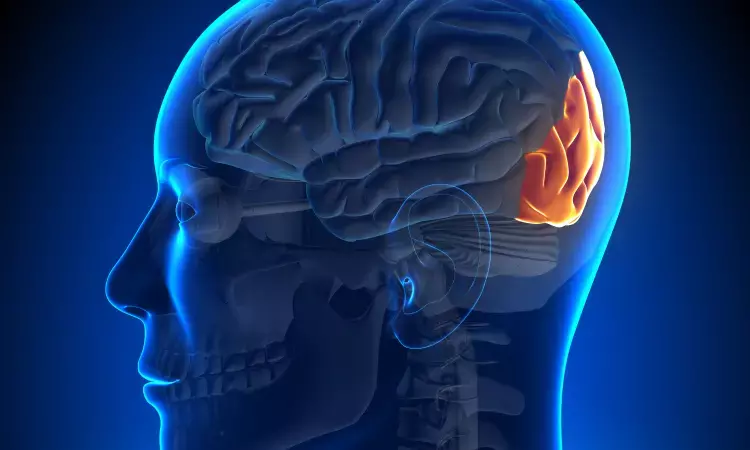- Home
- Medical news & Guidelines
- Anesthesiology
- Cardiology and CTVS
- Critical Care
- Dentistry
- Dermatology
- Diabetes and Endocrinology
- ENT
- Gastroenterology
- Medicine
- Nephrology
- Neurology
- Obstretics-Gynaecology
- Oncology
- Ophthalmology
- Orthopaedics
- Pediatrics-Neonatology
- Psychiatry
- Pulmonology
- Radiology
- Surgery
- Urology
- Laboratory Medicine
- Diet
- Nursing
- Paramedical
- Physiotherapy
- Health news
- Fact Check
- Bone Health Fact Check
- Brain Health Fact Check
- Cancer Related Fact Check
- Child Care Fact Check
- Dental and oral health fact check
- Diabetes and metabolic health fact check
- Diet and Nutrition Fact Check
- Eye and ENT Care Fact Check
- Fitness fact check
- Gut health fact check
- Heart health fact check
- Kidney health fact check
- Medical education fact check
- Men's health fact check
- Respiratory fact check
- Skin and hair care fact check
- Vaccine and Immunization fact check
- Women's health fact check
- AYUSH
- State News
- Andaman and Nicobar Islands
- Andhra Pradesh
- Arunachal Pradesh
- Assam
- Bihar
- Chandigarh
- Chattisgarh
- Dadra and Nagar Haveli
- Daman and Diu
- Delhi
- Goa
- Gujarat
- Haryana
- Himachal Pradesh
- Jammu & Kashmir
- Jharkhand
- Karnataka
- Kerala
- Ladakh
- Lakshadweep
- Madhya Pradesh
- Maharashtra
- Manipur
- Meghalaya
- Mizoram
- Nagaland
- Odisha
- Puducherry
- Punjab
- Rajasthan
- Sikkim
- Tamil Nadu
- Telangana
- Tripura
- Uttar Pradesh
- Uttrakhand
- West Bengal
- Medical Education
- Industry
Occipital nerve stimulation suitable therapeutic strategy for refractory chronic cluster headache

Spain: A recent study published in the Journal of Neurology has highlighted the role of Occipital Nerve Stimulation (ONC) as the first therapeutic strategy for refractory chronic cluster headache (rCCH).
Cluster headache (CH) is a rare and severe form of headache with a circadian pattern. This type of headache is characterized by unilateral periorbital pain and untreated headache attacks (shorter than 3 hours). The condition shows male predilection.
The impacts of CH severity are socioeconomic, morbidity-associated, restricted daily activities, direct costs of healthcare services, indirect costs of lost workdays, and reduced work efficacy.
In Denmark, one of the studies mentioned that less than 50% of CH patients are treated by headache specialists, 30% report missed work, and 78% report daily activity restrictions. This points out that CH is a disabling painful condition.
Treatment plans have included verapamil, lithium, oral or iv steroids, topiramate, methysergide, ergots, and long-acting triptans. Greater occipital nerve infiltration is also a therapeutic option and requires an appropriate clinical experience. Patients may not respond to the mentioned treatments, and the cause remains unknown.
This urgent clinical situation led physicians and patients to try unusual treatments, but the evidence remains limited and sparse. There is a need to scientifically document the therapeutic options, including the invasive ones.
Considering this, a study was conducted by Dr. Javier A. Membrilla from the Neurology Department, "La Paz" University Hospital, Madrid, Spain, with a team of researchers to answer, What could be the therapeutic choice in rCCH?
The critical points of the study are:
• The researchers conducted a systematic review and meta-analysis.
• The database searched were MEDLINE, Embase, Cochrane, clinicaltrials.gov, and the WHO's-International-Clinical-Trials-Registry-Platform.
• The analysis included those studies which had preventive treatment for rCCH by the European Headache Federation consensus statement. Overall, 45 studies met the eligibility.
• The studies included the effect of neuromodulation for preventive treatment for rCCH.
• Occipital nerve stimulation (ONS) was the most studied neuromodulation technique and had a pooled response rate of 57.3 % in the meta-analysis.
• The second most studied treatment was Deep brain stimulation (DBS), with a pooled response rate of 77.0%.
• DBS results were more heterogeneous than ONS.
• The remaining therapies include serial occipital nerve blocks, warfarin, anti-CGRP pathway drugs, ketamine-magnesium infusions, clomiphene, onabotulinum toxin A, ketogenic diet, sphenopalatine ganglion radiofrequency or stimulation, vagus nerve stimulation, percutaneous bioelectric current stimulation, upper cervical cord stimulation, and vidian neurectomy presented with weaker results and they had less quality of evidence.
The researchers finally concluded that ONS could be the first therapeutic strategy for patients with rCCH based on the current evidence. The researchers acknowledged Blanca Fuentes for her guidance in the study.
Further reading:
Membrilla, J.A., Roa, J. & Díaz-de-Terán, J. Preventive treatment of refractory chronic cluster headache: systematic review and meta-analysis. J Neurol (2022).
BDS, MDS in Periodontics and Implantology
Dr. Aditi Yadav is a BDS, MDS in Periodontics and Implantology. She has a clinical experience of 5 years as a laser dental surgeon. She also has a Diploma in clinical research and pharmacovigilance and is a Certified data scientist. She is currently working as a content developer in e-health services. Dr. Yadav has a keen interest in Medical Journalism and is actively involved in Medical Research writing.
Dr Kamal Kant Kohli-MBBS, DTCD- a chest specialist with more than 30 years of practice and a flair for writing clinical articles, Dr Kamal Kant Kohli joined Medical Dialogues as a Chief Editor of Medical News. Besides writing articles, as an editor, he proofreads and verifies all the medical content published on Medical Dialogues including those coming from journals, studies,medical conferences,guidelines etc. Email: drkohli@medicaldialogues.in. Contact no. 011-43720751


